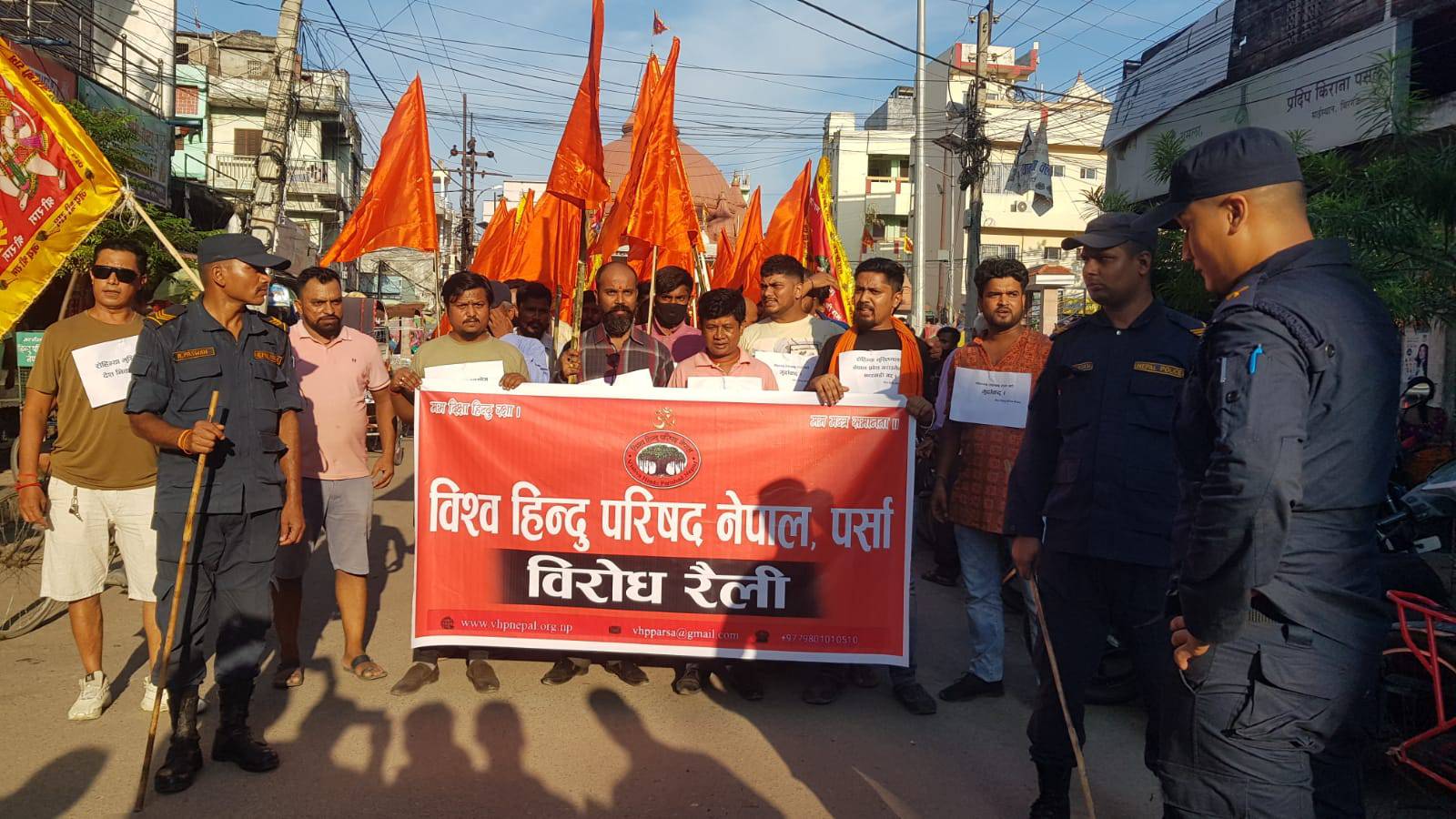Nepalese products, spices, culture and people are easy to find in India’s capital city of New Delhi. This integration of the Nepalese into the Indian socio-cultural fold is the result of India’s long-standing investments and interests in its northern neighbor. The large-scale migration of Nepalis to India can be attributed to open borders, ease of migration, business-friendly policies, and simplified banking processes that make it easier for Nepali residents to live and work in India.
Porous borders not only facilitate the exchange of people and products but also the spread of tireless passion and propaganda.
In August 2023, videos of people in eastern Nepal’s Dharan city openly consuming beef drew flak and created national outrage. Consuming bovine meat is forbidden in the Hindu-majority country, and oxen slaughter remains illegal. After the videos went viral, several Hindu groups marched in protest and quickly connected the issue to the presence of a church opposite a Hindu temple. Though violent riots were prevented, the smoke and tension of radicalism simmered within the city for days.
The rise of Hindu nationalism in India and the quest for turning India into a “Hindu nation” is also influencing political counterparts in Nepal, with the right-wing Rastriya Prajatantra Party (RPP) leading the charge. In February 2024, the RPP submitted a 40-point charter to the Prime Minister’s Office, demanding that Nepal be declared a Hindu kingdom with monarchy as its guardian. This sentiment is also shared by a section of Nepali society, who demand the resurrection of the Hindu monarchical system despite the abolition of the centuries-old institution more than 16 years ago.
Across the country, institutions continue to rally around a shared vision, but the active influence of India’s ruling Hindu nationalist Bharatiya Janata Party (BJP) and its ideological parent, the Rashtriya Swayamsevak Sangh (RSS), strengthens the push for a Hindu Kingdom. This influence frames the spread of Christianity in Nepal as a threat to its Hindu identity.
The chief minister of India’s Uttar Pradesh state, Yogi Adityanath, who is known for his anti-Muslim policies and politics, wrote a letter to the Prime Minister of Nepal in 2015 urging him to declare Nepal as a ‘Hindu nation.’ In 2021, BJP spokesperson Vijay Sonkar Shastri echoed this sentiment, stating that Nepal was and will always remain a ‘Hindu Kingdom.’
The influence of India-based Hindu nationalist leaders and groups runs deep in Nepal. Hindu Swayamsewak Sangh (HSS), the Nepal affiliate of the RSS, established in the early 1990s, has steadily expanded its footprint across Nepal. Through grassroots organizing, shakhas (morning drill sessions), and religious events, the HSS has promoted Hindu nationalist ideology, providing training to its cadre that mirrors the methods employed by the RSS in India.
Militant RSS affiliates, such as the Vishwa Hindu Parishad (VHP) and Bajrang Dal, have also set up units in Nepal and adopted aggressive tactics similar to their Indian counterparts.
In 2024, these groups led numerous protests and rallies across Nepal to pressure the government into enacting Hindu nationalist policies, including the death penalty for cow slaughter, a ban on religious conversions, and re-establishing Nepal as a Hindu Kingdom. It reflects a broader transnational agenda that seeks to reinforce Hindu nationalist influence beyond India’s borders.
Anti-Christian sentiment has been on the rise in Nepal, a country that hosts the world’s fastest-growing Christian population. This trend has provoked significant concern among Hindu priests who see Nepal’s identity as inherently tied to Hinduism. The increasing presence of churches and a growing Christian community have fueled a sense of vulnerability among extremist Hindu organizations.
While anti-Muslim sentiment has not yet become a deeply entrenched aspect of daily life in Nepal, there is growing evidence of Nepalese youth participating in cross-border religious and extremist gatherings organized by the RSS and its affiliates in the border areas of India’s Uttar Pradesh state. These events draw truckloads of Nepalese men and women who attend religious meetings led by extremist Hindu groups. Some of these participants exhibit an internalized perception of Christians as the ‘enemy,’ influenced by a belief that Western powers are intent on altering Nepal’s dominant religion and demographic composition.
In August 2024, VHP leaders organized an event in Nepal’s Sunsari district, converting at least 2,000 Christians to Hinduism. A similar event in December 2023 saw 430 Christians converted.
As these events unfold, Nepal appears to be caught in a delicate balancing act—clinging to its secular present while simultaneously grappling with the rhetoric of its Hindu past. Whether Nepal ultimately succumbs to the pressures of Indian exported Hindu nationalism or reaffirms its secular commitment will determine the future of religious freedom and social stability within the country.
(Tarushi Aswani is a journalist based in New Delhi. She covers stories on human rights, governance, religion and politics in South Asia.)
